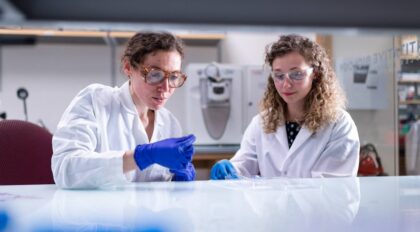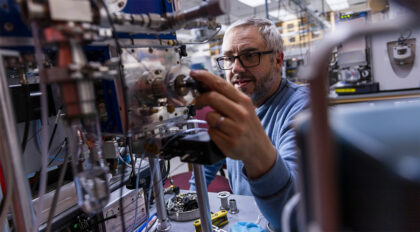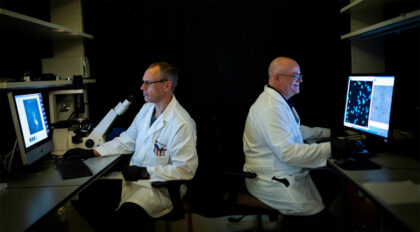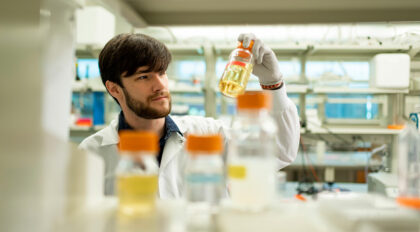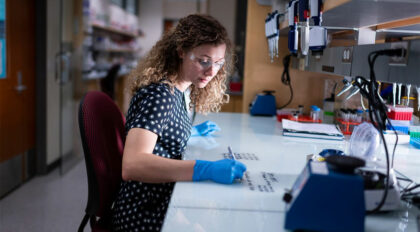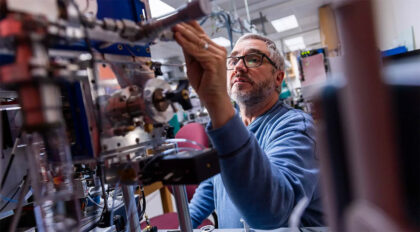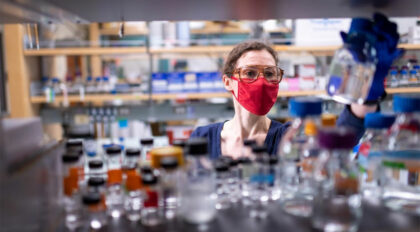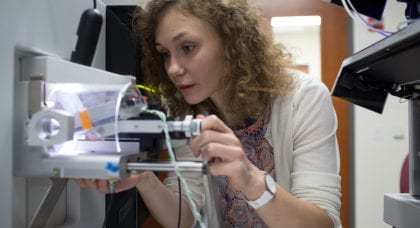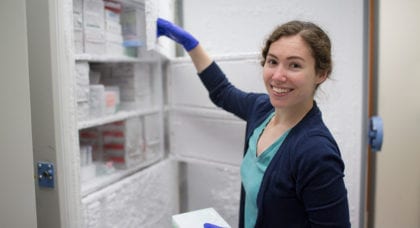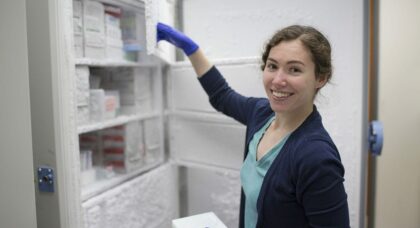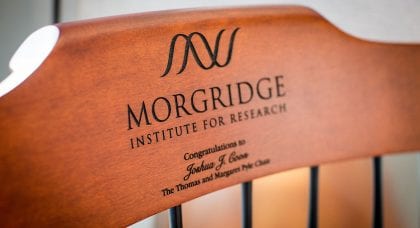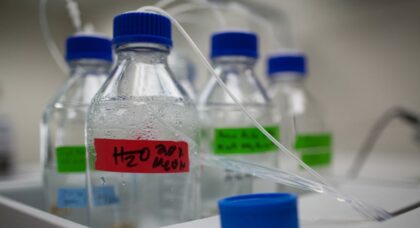Tag: Joshua Coon
Plasma Proteomics With Professor Joshua Coon
via Technology Networks
Human plasma contains thousands of proteins that provide clues about healthy biology and disease. Morgridge PI Josh Coon explains how mass spectrometry advances are helping unlock plasma’s secrets.
Josh Coon receives award for contributions to the proteomics field
via US Human Proteome Organization
Josh Coon received the 2025 Donald F. Hunt Distinguished Contribution in Proteomics Award based on scientific achievement and mentorship within the field.
New mass spec method gets the ‘nMOST’ out of multiomics data
The Coon Lab developed a new method to acquire multiomic data as quickly and as comprehensibly as possible, while keeping the system simple and accessible for anyone to use.
Morgridge supporters get a closer look at metabolism research with the Coon Lab
During a special event, the Joshua Coon Lab welcomed a group of enthusiastic, science-curious donors and supporters for a hands-on exploration of the technologies used in metabolism research.
Rising Sparks: Katherine Overmyer, metabolism
Katie Overmyer collaborates with metabolism researchers to push the boundaries of mass spectrometry technology and uncover answers to important biological questions.
Pounding out the dents: Westphall’s career solved problems, advanced discovery
Mike Westphall, a distinguished scientist in the Josh Coon Lab, will retire this month after a legacy of developing cool tools in the name of scientific discovery.
Researchers illuminate HIV in cell-to-cell attack mode
When cells infected with HIV make contact with uninfected cells, a new study reveals how that connection unleashes a hornet’s nest of activity that helps drive transmission.
‘Deep proteome’ project provides atlas for human complexity
The Josh Coon Lab developed a meta-scale approach to quantifying the human proteome and the massive number of protein variants produced by the human body. Proteomics is a cornerstone of biology and a precursor to understanding how protein dysfunction contributes to disease.
Mass spec fueling new explorations at the Carbone Cancer Center
Every cell has about 20,000 proteins, several hundred metabolites, and couple of thousand lipids. When those things get perturbed, bad things can happen. But measuring those changes may offer essential clues for fighting cancer.
The Morgridge Metabolism Initiative: A blueprint for collaboration
The Morgridge Metabolism Initiative helps hundreds of campus scientists learn from each other and push the boundaries of research that is central to human health questions such as aging, diabetes and cancer.
Technical tour de force: Orphan proteins in mitochondrial disease
In new findings in Nature, a team at the Morgridge Institute for Research and Washington University School of Medicine in St. Louis analyzed dozens of ‘orphan’ mitochondrial proteins and suggested functions for many of them — an important step to finding better ways to diagnose and treat poorly understood human conditions.
Game-changer: New tech could transform biotechnology
In new research in Nature Communications, the Joshua Coon Lab describes a game-changing advance that unites the power of mass spectrometry with the potential of electron microscopy (EM) — a finding that could transform biotechnology.
Open wide: Detecting links between what’s in your mouth and illness
Using tiny specks of dental plaque, scientists at the Morgridge Institute for the first time compiled a sophisticated analysis that opens the door to using the trove of micro-organisms in your mouth as an indicator of other health issues.
Coon lab’s ’smart toilets’ project a hot commodity
via The Wall Street Journal
Morgridge investigator Josh Coon’s unique project marrying mass spectrometry technology to the everyday toilet is tabbed as one of the trends to watch in the Wall Street Journal’s “Future of Everything” series.
Unraveling the network of molecules that influence COVID-19 severity
Researchers have identified more than 200 molecular features that strongly correlate with COVID-19 severity.
Multi-omic data and interactive web tool made publicly available to aid COVID-19 research
Why is it that some COVID-19 patients become extremely ill and die, while others experience only mild symptoms? A new study uses mass spectrometry, RNA sequencing, and machine learning to explore the molecular traits that might influence the severity of the disease.
Smart toilets could transform health tracking. Here’s how
via ZDNet
Morgridge investigator Josh Coon describes how “smart toilets” could be the new frontier in personalized medicine.
Albany Med Pulmonologist Partners with University of Wisconsin on COVID-19 Research
via Albany Medical College
An Albany Med physician who has been caring for COVID-19 patients during the pandemic is partnering with the Morgridge Institute and UW–Madison to study why some patients experience COVID-19 more severely than others.
Faculty receive WARF, Kellett, Romnes awards
via UW–Madison
Morgridge Affiliate Dominique Brossard and Morgridge Investigator Joshua Coon are 2020 recipients of Kellett Mid-Career Awards, given by the Wisconsin Alumni Research Foundation every year to recognize mid-career excellence.
Albany, Wisconsin teams search for molecular clues to defeat COVID-19
In the center of the COVID-19 pandemic, many hospitals are racing to maintain quality care for patients with severe disease while facing a shortage of resources and limited understanding of the novel coronavirus.
‘Smart’ toilet analyzes your pee, may revolutionize personal health
via USA Today
Scientists at the University of Wisconsin think their “smart toilet” is capable of monitoring your health and discovering early signs of diseases.
Can ‘smart toilets’ be the next health data wellspring?
Wearable, smart technologies are transforming the ability to monitor and improve health, but a decidedly low-tech commodity — the humble toilet — may have potential to outperform them all.
Overmyer named new associate director of mass spec lab
Katherine Overmyer, a former Morgridge postdoctoral fellow, was named the associate director of the Laboratory for Biomolecular Mass Spectrometry (LBMS) at UW–Madison.
New Pyle Chair honors Morgridge affiliate Joshua Coon
A new chair at the Morgridge Institute for Research takes aim at osteoarthritis, a debilitating and painful disease that affects more than 27 million Americans. Currently, osteoarthritis is largely treated with palliative care to help patients alleviate their symptoms.
Measuring the molecules of life – Q&A with Josh Coon
Proteins are the workhorse molecules that perform all the functions in the cell and the body. Being able to detect and measure proteins is critical to figuring out basic biology, and the signature of diseases such as Alzheimer’s, cancer and diabetes. Josh Coon is creating technologies to do exactly that.
Tech investment spurs Alzheimer’s research
The Laboratory of Biomolecular Mass Spectrometry (LBMS), launched in summer 2015, accelerates the university’s ability to apply this powerful technology to high-impact projects, says Joshua Coon, UW–Madison professor of chemistry and biomolecular chemistry and LBMS director.
Morgridge, campus partner to power up ‘mass spec’ potential
The Morgridge Institute for Research, as part of its Metabolism Initiative, is working with a University of Wisconsin–Madison team to greatly expand the scope of “mass spec” applications on campus. A new resource housed in the UW–Madison Biotechnology Center brings together a multi-million dollar investment in mass spectrometry tools from multiple sources to form a central repository to tackle large-scale investigations.
Study reveals critical similarity between two types of do-it-all stem cells
In a study published today (Sept. 11), researchers at the University of Wisconsin–Madison report the first full measurement of the proteins made by both types of stem cells. In a study that looked at four embryonic stem cells and four IPS cells, the proteins turned out to be 99 percent similar, says Joshua Coon, an associate professor of chemistry and biomolecular chemistry who directed the project.


